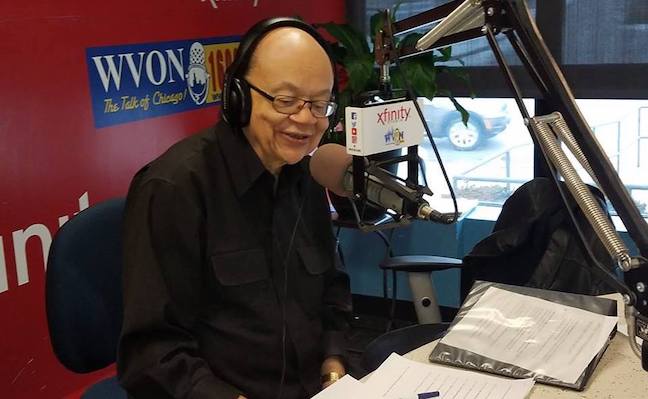He became an icon as he guided Black Chicago through decades of social and economic challenges with a talk show that featured interviews with mayors, governors and a celebrity roster of Black leaders.
Today, WVON Radio host “Cliff” Kelley, known as “The Governor of Talk Radio,” remains a living legend and important figure in Chicago’s political and media history.
But when Kelley’s fans mounted a campaign to recognize him with an honorary street sign in Bronzeville, they hit a huge snag. Despite Kelley’s contributions to the city, they were advised he would have to die first to be awarded the honor fans say he deserves.
Kelley and his followers can thank Alderman Anthony Beale (9th Ward), who sponsored an amended city ordinance that requires that honorees be deceased in order to receive an honorary street sign. In addition to Beale, 15 Black aldermen were among the 44 aldermen who passed the amended ordinance.
Say what?
Despite the ordinance, Kelley’s fans are moving forward with their campaign anyway. They argue Kelley should be an exception because of his contributions as an iconic WVON radio host who won the hearts of tens of thousands of listeners.
“We need to honor him today, right now,” said Glenda Smith, a close friend who produces Kelley’s Saturday afternoon show, America’s Heroes Group. “Why wait for him to die to honor him with a street sign? That makes no sense!”
In February, Smith said she contacted Alderman Jeanette Taylor’s (20th Ward) office to request an honorary street sign for Kelley. Smith said she was in disbelief when a staff member told her that Kelley had to be dead before the city would fulfill her request.
Smith was apparently unaware of what happened in 2017 at City Hall.
That year Alderman Beale sponsored a proposal that aimed to make it harder for those wanting the city to grant anyone an honorary street sign. Beale was also Transportation Committee Chairman at the time. With over 1,500 of the brown rectangular signs on street poles across the city, critics said there were too many of them.
The city’s transportation officials complained to then-Mayor Rahm Emanuel that putting up the honorary signs was taking too much time that could be spent on more important things, like taking care of the city’s regular street signs that have a deeper purpose and have been up much longer.
The Council agreed and on February 22, 2017, Beale’s proposal passed by 44-2. Four aldermen were absent. All the city’s Black aldermen voted in favor of the ordinance except Alderman Toni Foulkes (16th Ward) and Alderman David Moore (17th Ward). Alderman Walter Burnett (27th Ward) was absent and did not vote.
Under the revised ordinance, “No living individual shall be the subject of a Designation.”
The revised ordinance also limits each ward to two requests per calendar year. In addition, no honorary street sign will be given when there is already one for another individual in the same section of the street.
After five years, the honorary sign will be taken down unless the alderman renews it. The honoree or person requesting the honorary sign will also be required to pay the cost of the sign and the installation, which ranges between $600 and $1,200.
Records of the Council meeting show that moments before the proposal passed, the Council passed nine requests for honorary street signs. One of them renamed a three-block stretch of North Luis Munoz Marin Drive for Oscar Lopez Rivera in Alderman Robert Maldonado’s 26th Ward.
A Puerto Rican nationalist, Lopez Rivera served 35 years in prison after being convicted of trying to overthrow the U.S. government. His sentence was commuted by then-President Barack Obama.
In July 2017, months after the city ordinance was revised, an honorary street sign in Alderman Jason Earvin’s 21st Ward that honored Rosebud restaurant owner Alex Dana was removed after the Crusader published a story about Dana’s $1.9 settlement with the EEOC.
Rosebud was accused of discriminating against hundreds of Black applicants. Last year, the Crusader discovered the sign was back up as it published a story that reported Dana’s Rosebud chain received between $2 million to $5 million in federal PPP loans during the early stages of the coronavirus pandemic.
A request for comment on this story, sent to Alderman Howard Brookins, Jr. who chairs the Transportation Public Ways and Means Committee, was never returned.
Smith believes Kelley has earned the distinction of having an honorary street sign with his name. He was an on-air celebrity with WVON for 27 years. Kelley stepped down from his signature talk show following 25 years of interviewing prominent leaders, including Governor Pat Quinn, Mayor Richard M. Daley, Jesse Jackson Sr., and then-Senator Barack Obama.
A graduate of Englewood High School, Roosevelt University and the John Marshall Law School, Kelley served for 16 years as a former 20th Ward alderman.

He has been an advocate for racial equality, has been an elected school board member and a pioneer for LGBTQ rights. Several commissioners praised him for his LGBTQ support during a time when they said it was not a popular stance to take.
In 1972 Kelley led other Black aldermen in opposing a routine request by the Lake Shore Athletic Club for permission to put up an outdoor canopy after the facility had a history of discriminating against Blacks and Jews.
Kelley continues his independently produced “America’s Heroes Group” talk show, geared toward veterans, the Armed Forces and their family members, which airs on Saturdays. Through the America’s Heroes Group broadcasts, Kelley continues to garner massive local and national support from the African-American community.
To some, Kelley’s years of service gained him redemption after he served a year in jail when he and several men were accused of taking thousands in cash from a con man and failing to file three years of income tax returns. Smith believes his alleged crime is no different from those of Rosebud’s Dana, and Puerto Rican nationalist Rivera, who both have been awarded an honorary street sign.
“Cliff paid his dues to Chicago. There is no reason why he should not be honored while he is alive. It’s a slap in the face to wait until he is gone to honor him. We need to make this happen,” said Smith with conviction.
Alderman Taylor, who was not in office when the honorary street sign ordinance was amended, does not think it’s fair. Taylor said she too wanted to honor a living individual with a street sign but cannot because of the ordinance.
“It doesn’t work well,” she told the Crusader. “You give people flowers when they are alive, not when they are dead.”






